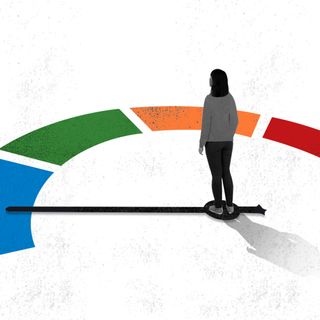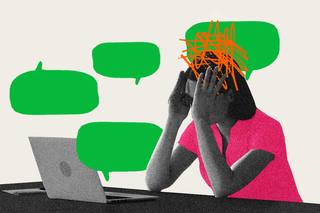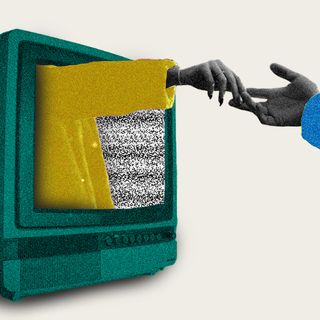
How the Pressure To Be Politically Correct Can Lead to Mental Fatigue
“[W]e are most definitely not saying that people should not be politically correct… [But] there are likely a number of ways in which these negative effects can be mitigated.”

“Th[e] pressure [to always say the ‘right’ thing] is definitely making me more socially anxious day by day,” M., a 28-year-old, had told The Swaddle in 2021. Indeed, the pressure to be politically correct — on social media, at the workplace, in conversation with friends — can be a taxing process. A new study, in fact, likened it to “walking on eggshells,” and found that it can lead to the accumulation of mental fatigue at the end of the day.
It might be pertinent to mention at the very outset, though, that the research doesn’t vouch for toning down political correctness, but seeks merely to recognize its costs.
“[W]e are most definitely not saying that people should not be politically correct… Ours is just a first step towards better understanding both the causes and consequences of being politically correct. There are likely a number of ways in which these negative effects can be mitigated, and so our paper showing these negative effects will, we hope, spur some of these efforts,” stated Joel Koopman and Klodiana Lanaj, co-authors of the study from the Texas A&M University and the University of Florida, respectively.
Published in the Journal of Applied Psychology, the study was conducted in two parts and included a total of 447 participants. The researchers investigated the impact of political correctness — or as PsyPost defined it, “engaging in self-censorship to avoid marginalizing or offending others” — at the workplace. The research concluded that greater “cognitive resource depletion” followed after conversations with co-workers that involved delivering critical feedback or engaging in a performance-related conflict — basically, any exchange where the participants felt a stronger need to be politically correct. In the present culture, there is lesser room for making mistakes; in the process, we’ve created a vast chasm of stress and anxiety.
Related on The Swaddle:
The Pressure To Always Say the ‘Right’ Thing Affects the Way We Communicate
Manvi Sharma, a psychotherapist, explained last year how social media has exacerbated the anxiety around the subject by making people feel like they’re “being watched all the time.” She believes witnessing others dealing with an unforgiving, judgmental space online can make the internet itself seem like a “scary place.” The mental toll that the study focuses on, though, goes beyond the fear of consequences — it looks into the fatigue of executing the task of being politically correct. But the two aren’t divorced from each other — in fact, the fear and the fatigue are part of the same vicious cycle.
As the study notes, political correctness has become a “double-edged sword.” It is borne out of kindness and consideration that we desperately need in the current cultural atmosphere; its execution, however, exacts a toll that is rarely discussed — at least, outside of conservative, or even bigoted, spaces teeming with individuals who would rather return to the pre-political correctness status quo. As such, deliberations around the cost of political correctness are often presumed to flow from a similar mindset — preventing the toll from being acknowledged due to the threat of being “canceled;” basically, revealing the aforementioned vicious cycle.
To reiterate, though, political correctness itself isn’t a matter of contention at all. In fact, based on their findings, Koopman and Lanaj noted that “[E]mployees choose to act with political correctness at work because they care about the coworker with whom they are interacting… political correctness comes from a good place of wanting to be inclusive and kind.”
The depletion of energy, instead, arises from “many of the behaviors involved in being politically correct — [like] monitoring situations to evaluate whether something might be offensive, aligning oneself with normative expectations, and suppressing certain words or behaviors.”
Related on The Swaddle:
Our Activism Is Too Focused on Performance to Acknowledge Allies Who Aren’t ‘Vocally’ Woke
Unfortunately, this fatigue isn’t just something one can sleep through — only to wake up fresher, and repeat the cycle. It, too, has consequences. “[B]eing politically correct may be exhausting, and as a result, employees might be particularly tired and argumentative at night. And so… they need to be aware of how it makes them feel and strive to avoid enacting negative behaviors at home,” Koopman and Lanaj explained, noting that without “understand[ing] these possible costs,” we have no way of successfully coming up with “possible ways to mitigate the depletion [people] may feel from being politically correct.”
While such measures are yet to be researched, Koopman and Lanaj do have some suggestions. “[M]indfulness exercises, as well as perhaps focusing on the positive impacts of one’s behavior on others, could reduce some of these effects. In addition, an argument could be made that actually increasing the amount of political correctness might help here too, as the acts would become more practiced and thus less demanding.” But, as they noted, “All of this, however, would need to be tested.”
However, there’s no guarantee that researchers will be able to develop a one-size-fits-all solution for everyone. In the meantime, choosing to refrain from being inclusive in our words and actions isn’t a solution. After all, for generations, communities marginalized by their caste, class, race, and neurodivergence, among other things, have engaged in code-switching and camouflaging simply to survive, which can, arguably exact tolls much worse than trying to be politically correct. The latter isn’t a self-sacrificing act of kindness; it’s a basic virtue that can play an important part in building a more inclusive, empathetic world.
So, until further research, perhaps, we can attempt to understand how exactly the fear and fatigue manifest for us, as individuals, rather than completely ignoring the fact that being politically correct can be labor-intensive.
Devrupa Rakshit is an Associate Editor at The Swaddle. She is a lawyer by education, a poet by accident, a painter by shaukh, and autistic by birth. You can find her on Instagram @devruparakshit.
Related


Parasocial Relationships With TV Characters Linked to Viewers’ Personality Traits, Study Shows
